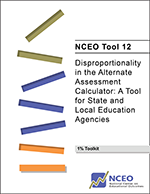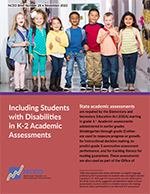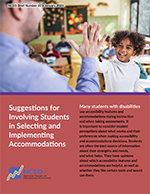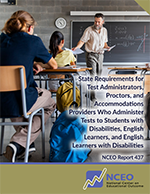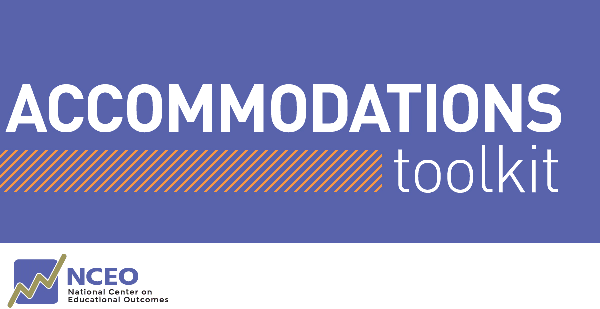Welcome
Greetings from NCEO in a new year. The year 2023 arrived quickly, and a lot already is happening. I always enjoy working with the team that pulls together the NCEO eNewsletters. As we work to select which products and activities to highlight, it is a wonderful opportunity to reflect on the many things that NCEO is doing
In this issue we share information about four new products: a disproportionality calculator tool that can be used to examine disproportionality with respect to student subgroup participation in the alternate assessment; a brief on including students with disabilities in K-2 assessments; a brief on involving students with disabilities in selecting accessibility features and accommodations; and a policy analysis of how states’ policies address the qualifications and training requirements for test administrators, proctors, and accommodations providers.
Additionally, this issue contains an updated list of accommodations included in the NCEO Accommodations Toolkit. There is both a research summary and a policy analysis for each accommodation included in the toolkit.
Finally, in this issue, we provide information on sessions at the annual conferences of the Council for Exceptional Children (CEC), the National Council on Measurement in Education (NCME), and the American Education Research Association (AERA) that include NCEO staff.
As always, we welcome feedback and ideas about what you would like to see in future issues of NCEO’s eNewsletter. We enjoy hearing from you.
– Sheryl Lazarus, NCEO Director
Disproportionality Calculator for Alternate Assessment Participation
Students who do not have the most significant cognitive disabilities may sometimes be inappropriately assigned to participate in the alternate assessment based on alternate academic achievement standards (AA-AAAS). There is concern that a disproportionate percentage of students from some racial and ethnic subgroups may be over-identified as having a most significant cognitive disability and inappropriately assigned to this assessment.
Including Students with Disabilities in K-2 Assessments
Many states and school districts have implemented K-2 academic assessments. These assessments are often used to measure progress or growth, for instructional decision-making, to predict grade 3 summative assessment performance, or to track literacy for reading guarantees. They may also be used in some State Systemic Improvement Plans (SSIPs), as either the State-Identified Measurable Result (SIMR) or as a measure of progress in a state’s evaluation plan for its SSIP.
Involving Students in Selecting and Implementing Accommodations
Many students with disabilities use accessibility features and accommodations during instruction and when taking assessments. It is important to consider student perceptions about what works and their preferences when making accessibility and accommodations decisions. Students are often the best source of information about their strengths and needs, and what helps.
New Report Documents State Policies for Test Administrators, Proctors, and Accommodations Providers
To help ensure that assessments are properly administered, states have developed policies about who can administer or proctor assessments and the training they must have. Similarly, states have policies regarding who can provide accommodations to help ensure that the accommodations are provided appropriately. Little is known about these policies.
Updated Accommodations Toolkit
NCEO publishes an Accommodations Toolkit that continues to expand. This toolkit provides easy-to-use summaries of the academic research literature on specific accommodations for students with disabilities as well as companion state policy analyses summarizing how each accommodation is included in states’ assessment accessibility policies.
Upcoming NCEO Presentations at CEC, NCME, and AERA
NCEO staff will present at the annual conferences of the Council for Exceptional Children (CEC), the National Council on Measurement in Education (NCME), and the American Education Research Association (AERA).
The Center is supported through a Cooperative Agreement (#H326G210002) with the Research to Practice Division, Office of Special Education Programs, U.S. Department of Education. The Center is affiliated with the Institute on Community Integration at the College of Education and Human Development, University of Minnesota. Consistent with EDGAR §75.62, the contents of this report were developed under the Cooperative Agreement from the U.S. Department of Education, but do not necessarily represent the policy or opinions of the U.S. Department of Education or Offices within it. Readers should not assume endorsement by the federal government.
Project Officer: David Egnor

